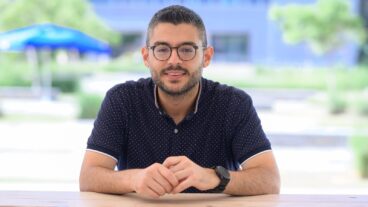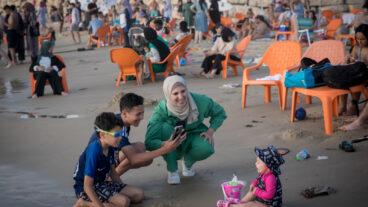Alon Maor (far right) meets boxing great Sugar Ray Leonard along with other participants in last month’s Children’s Congress.American children with juvenile (type 1) diabetes representing all 50 states who recently packed a special Senate hearing on Capitol Hill on the urgent need for continued funding to find a cure for diabetes received an unexpected boost from a guest ally – 17-year old Israeli Alon Maor.
Maor was one of six non-American youths invited to the semi-annual Children’s Congress of the Juvenile Diabetes Research Fund (JDRF) last month. And he along with over 200 other American children with juvenile diabetes joined together to hear Mary Tyler Moore, International Chairman of the JDRF, testify on the urgent need for continued funding to find a cure for diabetes. After the hearing – which included testimonies from six children with diabetes, researchers and an islet transplant patient – all the children and their families met with U.S. Representatives and Senators to put a personal face on their disease.
“Being in Washington as a representative of Israel was an amazing experience,” Maor told ISRAEL21c upon his return from the US. “In the congressional testimony, it was mostly the American kids who spoke, but we all met many Congressmen and officials including the Secretary of Health Tommy Thompson. It was a very special feeling to be part of such a big American delegation and there was a lot of bonding. We all went on the Walk to Cure Diabetes in DC, and we did a lot of sightseeing together.”
Maor’s mother Tammi, who is the JDRF-Israel’s spokesperson, said that she and Alon took the opportunity at every chance to explain what Israel is doing for diabetes research.
“We met congressmen and senators on Capitol Hill, and we had the chance to explain about Israeli stem cell research and how important it is for a long term cure. Many of the congressmen were surprised at the extent of the research going on in Israel,” she said, citing research into beta cell transplants going on at Hadassah Hospital in Jerusalem and Rambam Hospital in Haifa.
Among the research is the promising new islet transplantation protocol, during which insulin-producing cells are injected into the liver of a person with diabetes. To-date, more than 250 individuals in the US have undergone this procedure, and are now living diabetes-free. However, obstacles such as inadequate supplies of islets and imperfect methods to prevent transplant rejection and recurrent autoimmunity are still to be overcome and are being studied in Israel, Maor explained.
According to Shoshanna Mews, director of JDRF-Israel, Alon was an exemplary spokesman for Israel and for juvenile diabetes sufferers.
“Alon met with the Secretary of Health Thompson and explained to him about the disease, what Israel is doing to research cures, and they talked about the ways in which Israel and the US can be partners in the research,” she said. “One of the young participants from Atlanta asked Thompson, ‘how is it that the US doesn’t give top priority to researching isolated cell transportation, whereas Israel, with a fraction of the resources makes it a top priority.’?”
JDRF is the largest charitable funder of juvenile diabetes research worldwide, and as a result of JDRF funding, advocacy, and leadership, there have been significant recent breakthroughs in type 1 research, News explained.
The Children’s Congress has been held every other year since 1999, and it has become the largest media and grassroots event held in support of finding a cure for juvenile diabetes, raising national awareness about juvenile diabetes and participating in personal advocacy at the highest level of United States government. The President and Laura W. Bush are Honorary Co-Chairs of Children’s Congress 2003. In addition to Israel, five honorary international delegates have joined Children’s Congress from Denmark, Belgium, Australia, Canada, and the United Kingdom.
Alon Maor, the youngest of three brothers and was diagnosed with juvenile diabetes at the age of 8.
“My life changed, in all aspects,” he said. “For example, I gained a sudden maturity of character, having to be aware of my physical condition and my mental well-being all the time.?
When Alon turned 13, his parents gave him a special birthday present: “an insulin pump,” he said, “which I prefer to call my ‘blue beeper.’ The pump has made my life more comfortable, spontaneous, and suitable for a teenager’s lifestyle.”
But despite the great improvement with the pump, maor still desperately wants a cure.
“The fear of waking up with blood sugar of 250, the constant burden of having to carry all my diabetes supplies, sweets, and the pump, and even the thought of my parents having one more issue to worry about, are things I would never wish on my best friends or even my enemies,” he said.
Maor said he took pride in talking about Israel to his new American friends, and was surprised at what they thought they knew about the country.
“I guess I was popular, because I was Israeli and they were almost all Americans. Some of them knew nothing about Israel, and others asked about things they’d heard about in the news regarding the fighting. A lot of them had some misconceptions about life here, thinking there was shooting everywhere, and some of them didn’t even know we had TV and radio, thinking we were living in some primitive culture,” he said with a laugh.
Maor is entering his final year of high school and focusing on theater studies. Like any teenager, he likes going to the beach which is close to his Ramat Hasharon , and hanging out with friends. While diabetics are exempt from serving in the Israeli Army, Alon plans on volunteering next year in a non-combat unit when he finishes school.
“I’d like to go into intelligence, or maybe work for Army Radio. My older brothers are big combat soldiers, but I won’t be doing that. But that’s ok,” he said with a maturity that belied his age.
Maor’s mother Tammi thinks that there was a dual benefit that derived from the journey to Washington – for both Alon and for the Americans who met him. “I think Alon and all the other participants took back with them the ability to be very eloquent in speaking about themselves and what it’s like to have juvenile diabetes.”












